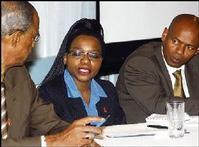Andrea Downer, Gleaner Writer
UNAIDS Country Representative to Jamaica, Miriam Maluwa (centre), in conversation with Public Defender Howard Hamilton (left), who is also chairman of the National AIDS Committee and Harold Robinson of the United Nations Population Fund. The occasion was a public forum on HIV/AIDS related litigation put on by the NAC at the Jamaica Pegasus Hotel in New Kingston last year. - WINSTON SILL/FREELANCE PHOTOGRAPHER
JAMAICA HAS made significant progress in meeting the targets, which the country committed to at the United Nations General Assembly Special Session (UNGASS) on HIV/AIDS in 2001. However, the country's uncoordinated response could prove detrimental to the success of the national programme.
Miriam Maluwa, Country Co-ordinator, UNAIDS, with responsibility for Jamaica, The Bahamas and Cuba, says the international agency is pleased with Jamaica's progress.
Jamaica was among 182 countries, which signed a Declaration of Commitment (DoC) and agreed to take specific steps to control the spread of HIV/AIDS and ensure that persons who are infected by the virus have access to treatment and care and that the rights of those affected and infected by HIV/AIDS are protected.
However, Ms. Maluwa believes that the country's success would have been far greater if the national HIV/AIDS response was less fragmented.
PURPOSE OF UNGASS
"The purpose of UNGASS is to look at the totality of the national response in relation to Government's commitment to the declaration. (Therefore) the various activities and programmes that are going on, they really ought to be analysed in relation to each other and the total impact that it's having or not having on the HIV response," Ms. Maluwa explains. Her analysis of Jamaica's approach to tackling the problem is shared by a number of organisations working in HIV/AIDS in the country.
President of the Jamaica Network of Sero-positives (JN+), Marcussaid a lot of Jamaicans are not aware of UNGASS or what it is really about. "I think there needs to be more awareness. I don't think enough effort is being made to enlighten the country on the commitments and what has been achieved so far," he states. "I don't think that Jamaica's review of the country's progress in meeting the UNGASS commitments which was released sometime this year was released early enough. It should have been made public from last year, and even though it has now been released, many persons still don't know how or where to access it," he continues.
A report done by the International Council of AIDS Service Organisation (ICASO) late last year also notes:
"In fulfilment of paragraph 37 of the DoC, the Jamaica HIV/AIDS/STI National Strategic Plan was drafted in 2001 and revised in 2002 after soliciting input from a variety of civil society actors. The larger agencies felt that the process successfully represented their views; however others, mainly PLWHA, felt that the Government misinterpreted their input and forced them to "rubberstamp" approval. Some Civil Society Actors (CSAs) who are not involved with the National Aids Council claimed that their access to information and input in policies and reviews of the National Response Programme limited."
The majority of the civil society members, who felt left out, lived and operated outside of the country's capital, Kingston, which could be considered the hub of the heavily centralised national response programme
According to the report, "Few Civil Society Actors are aware of the UNGASS Declaration of Commitment and only one CSA claimed involvement in any national review of progress toward implementation of the commitments. No CSA claimed the use of the document as an advocacy tool."
UNDERMINING THE
NATIONAL RESPONSE
Ms. Maluwa acknowledges that this lack of cohesion undermines the national response. She explained that while persons are involved in activities and programmes that are part of the National HIV/AIDS/STI Programme, they are not aware that their efforts are geared towards a specific purpose fulfilling the UNGASS commitments.
"There are a lot of sporadic and parallel events and programmes being developed, but not all of them are being perceived inside a national context. Everybody who is working on HIV/AIDS ought to know and ought to be contributing to the same commitments and the same indicators," Ms. Maluwa asserts.
Having recognised weaknesses in the national response strategy, Maluwa said UNAIDS is now looking at ways in which it can assist to support and strengthen the monitoring and evaluation system of the national HIV/AIDS response.
"The idea is to ensure that we have one set of national indicators, which are really, partly UNGASS indicators as well as other indicators that the country has to report on and agree on a set of national indicators against which everything that is happening in the country can be measured against," she states.
Despite the general lack of awareness about the UNGASS commitments, Ms. Maluwa gives Jamaica high marks in a number of key areas including the critical area of treatment, which falls under prevention an area that the United Nations asked governments to give priority in developing and executing their national response.
"Before 2004, Jamaica did not have a treatment programme, however, since then, the country has established a system that ensures that people who are HIV positive and in advanced stages of the disease, can access anti-retroviral, ARV, treatment. It is now possible to monitor the CD4 count of persons living with HIV/AIDS, PLWHA, and do appropriate referrals," she says..
Not the real name
The article above is part of a five-country series on the Caribbean's HIV/AIDS response since individual governments signed the United Nations General Assembly Special Session on HIV/AIDS Declaration of Commitment in 2001. This is a collaborative effort between Panos Caribbean and The Gleaner Newspaper.

